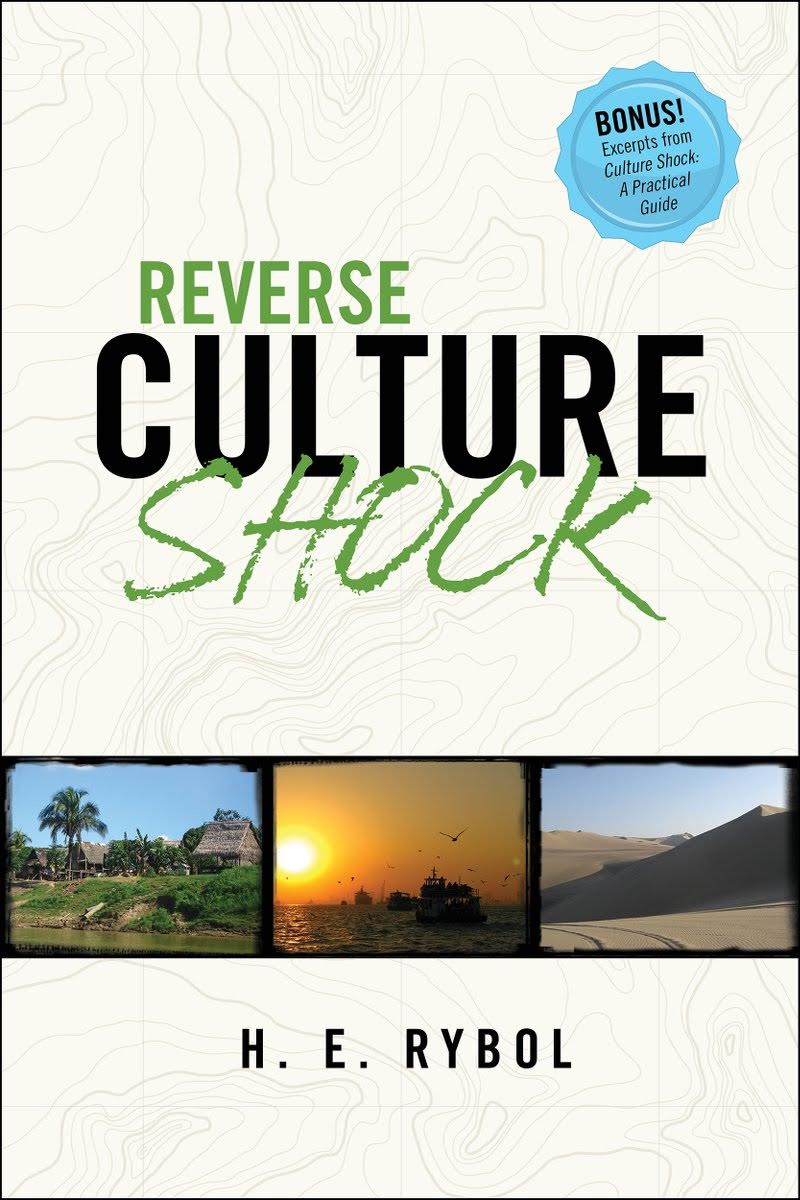Reverse Culture Shock: A Book Review
A review of the book by H.E. Rybol
Last spring I reviewed H.E. Rybol’s book Culture Shock. The book contains practical tips and considerations for coping with culture shock when travelling or living abroad. I thought much of it also applied to the smaller changes in life, a move across town for example. So when H.E. Rybol approached me about reviewing her new book Reverse Culture Shock I readily agreed.
Reverse Culture Shock is a collection of adapted blog posts, some of which were written in response to readers’ questions. She likens culture shock to a feeling of expansion and reverse culture shock to an implosion, a “shattered sense of belonging.” She talks of letting go of the notion of home as a physical or geographical place.
She begins with her own experience returning to Europe after four years in California where she became aware of her “Europeanness”. Back in Europe people kept pointing out her “Americanness”. Specific examples of the differences she noticed in the culture of the two places and in herself help the reader understand the feeling she had of a “puzzle put together wrong.” I connected with this section of the book, thinking about the differences between my last three winters in Arizona and the rest of my life in Manitoba, although the cultural differences I encountered were fewer and smaller than the ones she experienced.
H.E. Rybol goes on to provide tips for nurturing yourself through the discomfort and dealing with changes in friendships, pointing out that some of the same techniques which help one deal with culture shock can help with reverse culture shock.
H.E. Rybol’s background brings a unique perspective to the concepts of culture shock and reverse culture shock. She was born into two nationalities (French and German) and grew up in a third nation (Luxembourg). That perspective comes through in the section on languages, where she writes about the use of different languages, having a multi-lingual brain, and code-switching between languages. She talks of new cultural layers forming when you start living in another language. I found this section somewhat disjointed. That may be because it is outside of my experience. Her list of reasons for switching between languages in conversation may resonate better with someone who has lived in more than one language.
“While living in another country . . . we become sensitive to different values, different issues, different perceptions. And we’ll likely integrate some of these into our own sense of self.” The book is about learning to recognize and live with a changed sense of self. It is short and easily read in one sitting. It provides tips on how to cope with reverse culture shock and the new sense of self, but I was left wanting more. The story felt unfinished. I wanted her to come back to the experiences she began the book with and provide more details on how she dealt with the specific items of discomfort and what she felt like when she came to terms with the changes.
At the beginning of the book H.E. Rybol says her aim is “to provide comfort, food for thought, and a little nudge, if you need it, to ease a difficult transition.” Although I was left wanting more, I think overall she met her aim. Comfort is provided both in the description of reverse culture shock (it is comforting to know what you are feeling is normal) and the tips for coping. There is also a message running through the book that one cannot avoid a period of feeling “unsettled”. There are no quick fixes for this, but the tips along with the information about the positive outcomes of reverse culture shock and of travel may provide the nudge needed to get through it, knowing the journey is worthwhile. The book ends with a series of questions which provide food for thought. It may well be that the pondering of these questions is the most important tool to help you find your own personal path through reverse culture shock.
“With time we get used to the fact that the way we internalize our experiences and surroundings constantly changes.”
Culture Shock and Reverse Culture Shock are both available in Kindle versions on Amazon.
Disclosure: I received a free copy of the book. As usual, all opinions are my own.








Thank you so much for this thoughtful review, Donna. Much appreciated!
You’re very welcome Hélène.
I don’t understand the difference between expansion and implosion as they relate to culture shock. Does that mean you either expand to accommodate new experiences or you shut down? In either case, your sense of self in altered. Is that the point? Food for thought here.
Sydney, I interpret the use of the word explosion to describe culture shock as encountering so many new things it can overwhelming but ultimately an expansion of your world. On the other hand reverse culture shock may feel like your world caving in around you, a collapsing of the familiar. I think you can either expand or shut down in response to both feelings (and sometimes may go through periods of both until you finally assimilate into your changed self).
Very well written review Donna! Both the books have an interesting premise
Thanks Jacquie.
Hi Donna, interesting review and subject matter. Reminds me of the days when we had foreign exchange students. The shock they felt moving to America was to be expected. What came as a surprise to them was the culture shock they felt when moving back to their own country after becoming Americanized.
Susan, I think reverse culture shock may hit us harder than culture shock. We don’t expect it and we may be looking forward to going back to the familiarity of home after dealing with a lot of different ways only to find out it no longer feels familiar. It’s nice that you were able to keep in contact with your exchange students after they returned home.
Each time we return to the US now, we try to build in a couple of days at the beginning of our visits to go slowly because we’ve become aware of how disorienting “Reverse Culture Shock” can be. It really is strange to return to a country I used to think of as home and see life lived at a more frenetic pace and the staggering variety of choices available to the consumer. Your quote “…we become sensitive to different values, different issues, different perceptions…” sums up the feeling exactly. The book “reverse Culture Shock” sounds very interesting. Anita
Anita, with your experience I see you can relate well to the feelings described in the book. You’ve developed your own ways to cope with it although I appreciate how disconcerting your first trip back to the U.S. must have been.
Well-written review! And the book sounds like one that would be worth recommending to my daughter, who grew up in Holland but is now studying in the US. Coming home might indeed be a shock for her. It reminds me of how I felt after I returned to the US after two years in the Peace Corps in Malawi: I went to a supermarket and got so overwhelmed with the choices that I ran outside again.
Rachel, if your daughter does experience that shock when she comes home she’ll have a mother who understands what it is like and that can be a help.